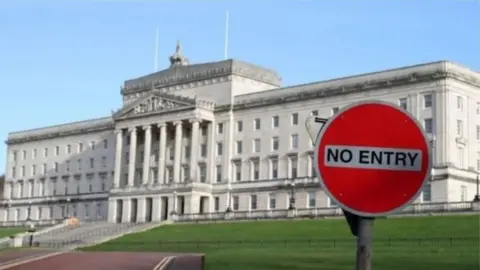What Northern Ireland budget means for health and education
 PAcemaker
PAcemakerA new Stormont budget will include £410m of the £1bn package negotiated by the DUP in return for backing the Conservatives at Westminster.
This is how that money will be allocated.
Health
The Department of Health has received a 2.6% increase in real terms.
Given that cost pressures are increasing at an even greater rate, according to health official sources it means there remains a shortfall of around £160m.
The picture could have been a lot worse for those who run the health service. They probably hoped that this budget had delivered enough money so that they were not facing the prospect of having to make savings in order to break even.
But the reality is that is where they find themselves.
Remember last year's cost saving plans? They were a result of a shortfall of around £140m.
While monitoring round money managed to bail out the service and cuts weren't as severe as originally planned, for several months the Health and Social Care Service was plunged into a doomsday scenario.
So is it a case of groundhog day?
Maybe not. On the back of the budget money, there's the bonus of over £100m towards transforming the Health and Social Care Service.
While this money is intended solely to help implement the recommendations of the Bengoa Review, it might provide a little wriggle room for Northern Ireland's stretched public services.
For that money to be used effectively, it should only be spent on long-term planning and transforming services for the future. And not for plugging any current holes or for helping to keep the lights on in health and social care.
Education
Although next year's education budget is technically increasing by 4.3% this is only when compared to last year's baseline budget.
However, last year the education budget received some extra money during monitoring rounds ending up with an extra £80m.
In effect this means that the budget for 2018/19 is what the Department of Finance calls "a flat cash allocation" - £1.939bn exactly what they ended up with last year.
As the Department of Economy budget is at a standstill - which means a real terms cut - there is unlikely to be any more money for universities or further education colleges.

Analysis: BBC NI business correspondent Julian O'Neill
Some tough decisions have been put on hold this year.
Increasing university fees, re-introducing prescription charges and ending free travel for 60-64-year-olds were all under consideration.
But they will now be-revisited in the next budget for 2019/20.
The one big policy shift is on regional rates.
The NI Executive always kept any increase in line with inflation.
But Karen Bradley has ditched what was seen as a key policy of Stormont and hiked the regional rate significantly.
It will put £22 extra on the average household bill.
On the DUP money, the only cash agreed with the Conservatives not coming yet is around improving broadband.
